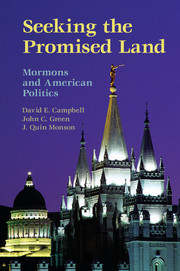2 - The Sacred Tabernacle
Mormons as an Ethno-Religious Group
Published online by Cambridge University Press: 05 August 2014
Summary
Most people do not take kindly to being described as “peculiar,” finding the term pejorative and perhaps even insulting. Not Mormons. In a national survey of Latter-day Saints we conducted, 79 percent agreed that they can be described as a “peculiar people,” echoing the frequent use of this phrase within LDS circles. If the willing adoption of peculiar as a label seems, well, peculiar, we should note that the phrase is biblical, used in both the Old and New Testaments to describe God’s people. The apostle Peter speaks of converts to Christianity as “a chosen generation, a royal priesthood, a holy nation, a peculiar people” (1 Peter 2:9), echoing the language in Deuteronomy describing the Israelites as “a holy people . . . a peculiar people” (Deuteronomy 14:2). In this context, peculiar does not mean strange so much as “chosen.” Mormons often use the term with a hint of wry humor, while also relishing the differentness that comes with being a practicing member of their faith.
Mormons’ self-perception of their peculiarity is empirically accurate. As we will detail in the pages to follow, Mormons are highly distinctive in many ways – religiously, culturally, and politically. In this chapter, we argue that Mormons are an example of an “ethno-religious” group – one of many in American history and society – characterized by a distinctive subculture. The Mormon subculture is peculiar: it has the high level of group solidarity typically associated with ethnicity, nationality, or race, but this ethnic-like character is the product of religion. We call this subculture the “sacred tabernacle.” However, high solidarity with insiders comes at the price of high tension with outsiders. This trade-off is the theme of this chapter and, indeed, this whole book.
- Type
- Chapter
- Information
- Seeking the Promised LandMormons and American Politics, pp. 25 - 42Publisher: Cambridge University PressPrint publication year: 2014



